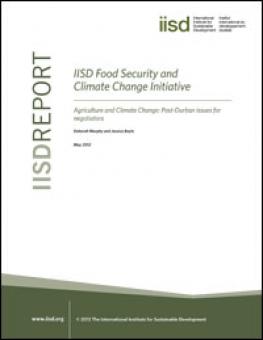
Agriculture and Climate Change: Post-Durban issues for negotiators
The inclusion of text on agriculture in the Outcome of the Work of the Ad Hoc Working Group on Long-term Cooperative Action under the Convention (AWG-LCA) was an important outcome of the COP 17 in December 2011.
This is the first time that agriculture has been "officially" recognized by the UNFCCC.
As part of IISD's Food Security and Climate Change Initiative, this paper examines the implications of the Durban Outcomes, and reviews party submissions on agriculture to the secretariat for consideration by SBSTA. It concludes by presenting critical issues that will need to be considered by negotiators in shaping a post-Durban programme of work on agriculture.
Participating experts
You might also be interested in
December 2024 | Carbon Minefields Oil and Gas Exploration Monitor
In November 2024, 23 oil and gas exploration licences were awarded across five countries, with Russia granting the licences that account for the largest portion of embodied emissions.
Increased Support Needed to Achieve India's Clean Energy Goals
India is on track to achieve many of its 2030 clean energy goals but needs to step up government support measures to accelerate the deployment of offshore wind, electric vehicles, and green hydrogen, according to a new report.
Budgeting for Net Zero
This study estimates the cost gap for battery energy storage systems (BESSs), offshore wind, solar photovoltaic (PV), electric vehicles (EVs), and green hydrogen (GH2) to inform government support.
Artisanal and Small-Scale Mining of Critical Minerals
This report examines the potential for artisanal and small-scale mining (ASM) to take an expanded role in the global supply of critical minerals.